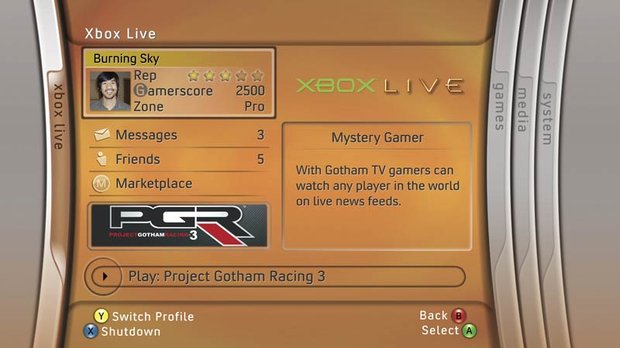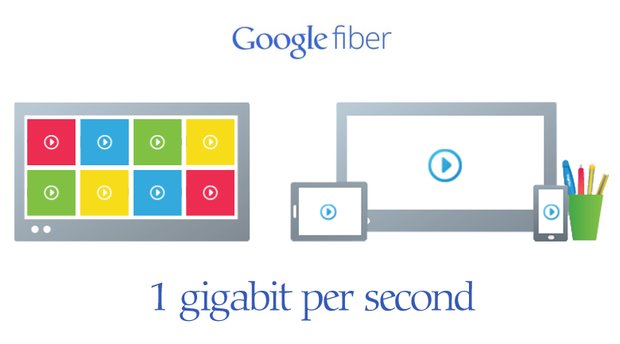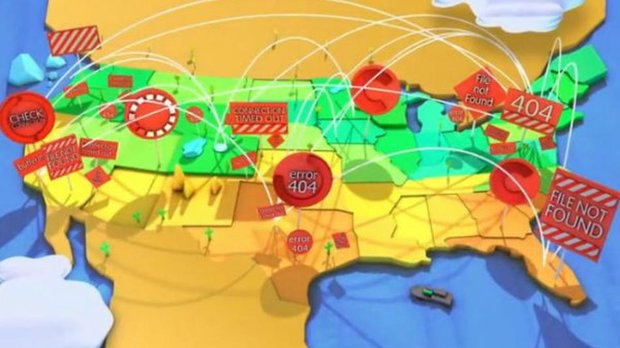Who has this majestic broadband internet in the U.S.?
In general, anyone who frequently takes their Xbox online today would most likely be able to handle an always-on console. The problem is there’s a sizable number of people that don't have the necessary broadband speeds in the first place.
But first, some quick context. In its latest quarterly earnings report last month, Microsoft shared that it had sold 77.2 million Xbox 360 units worldwide since the system's launch in November 2005. Of those,there are now 46 million Xbox Live members who, the company states, "regularly access Xbox Live" for "games and entertainment.” In other words, those are the ones who are actually taking their consoles online. A little bit of a discrepancy there.

More specifically, while an exact regional estimate is hard to pinpoint, the Xbox 360 has been the best-selling console in America for 27 consecutive months. In other words, Microsoft has a winning formula going in its home country when it comes to the Xbox's audience, one that it hasn’t reported in many other regions. Or in other other words, the success of an always-on Xbox would be pretty tightly bound to the state of internet in America today.
In its most recent quarterly "State of the Internet" report, Akamai found that, as of the end of 2012, 64% of Americans were using internet with speeds of greater than 4 Mbps. That's good for just thirteenth in the world, and puts the U.S. behind countries like Latvia, Switzerland, Hong Kong, and Canada when it comes to broadband adoption.
The U.S. Census Bureau pegs the country's population at more than 315 million people, so we're talking roughly 113 million people in the U.S. that don't have basic broadband internet speeds in their home. In other words, we’re talking a lot of people who either don’t have the internet for an always-on console, or at least can’t be sure that it would always run smoothly. That said, Akami's report indicated broadband adoption grew 16% year-over-year in 2012.
Akamai says that America's average internet speed is 7.4 Mbps, which is again a big yearly increase at 28%. That falls within the 6-15 Mbps range recommended by the FCC for sustaining a couple of high-demand tasks, but it's still a ways away from the more comfortable 15 Mbps and up speed tier. In fact, Akamai reports that just 19% of Americans are connected with speeds greater than 10 Mbps, though that number nearly doubled year-over-year.

The report gets more specific with regard to which states are tops when it comes to broadband adoption too. Generally speaking, northeastern states like New York, New Jersey, Maryland, and those in the New England region have the highest rates of adoption as well as the fastest speeds. Not surprisingly, more spread-out rural states like Arkansas, Mississippi, Nebraska, and the like are lagging behind in these kinds of categories, though most of them are gradually improving.
Weekly digests, tales from the communities you love, and more
The FCC further detailed the state of broadband access America in a blog post last January. There, it wrote that 98% of Americans have access to download speeds of at least 3 Mbps and upload speeds of 768 Kbps (which is below Microsoft's online recommendation above). Just 93% have access to those through more reliable wired connections, though. And when it comes to getting speeds of at least 6 Mbps, 81% have access—though again that includes wireless technologies. The FCC did not reply when we asked how many have access to wired speeds of at least 6 Mbps.
If Microsoft were to introduce an always-on machine, it would be creating one of the first game consoles that literally couldn't be played by millions of people from the get-go. That's just a little … different from what we're used to seeing.
So who charges for this broadband stuff in the U.S.?
The good is that broadband internet access is still growing, and that the government has a plan in place to get more people in the country onto superior broadband speeds within the next decade. We've been citing the FCC a lot in this article, and there's good reason for that: It's the agency behind the National Broadband Plan, and is actively studying the current state of U.S. internet, its ISPs, and how the whole thing can be improved.
Internet in America--and across most of the globe, really--has continued to improve with each passing year, so it shouldn't be too long before most of the rural areas, where broadband adoption and availability lags the most, will be able to speed things up. We've already seen the introduction of Gigabit internet services like Google Fiber too, which offer speeds that are 100 times faster than standard broadband today. New internet services should increase competition amongst ISPs, which in turn should bring about better results for consumers. An always-on console will seem far less questionable once services like that are widespread, technologically speaking at least.

The other good news is that the powerful ISPs carriers today--Comcast, AT&T, Verizon, Time Warner Cable, and others--mostly deliver on the services they promise. The FCC's latest 'Measuring Broadband America' report notes just that, and also explains that the average latency for broadband connections is in the 25-40 ms range. That's far below the recommended 150 ms ping time that Microsoft advises for online play with its console.
The bad news is that ISPs in America usually aren't the most agreeable bunch. As basically everyone has said at one point or another, for one reason or another, they frequently kind of suck. When viewed in a global context, the major providers generally charge more money for lower-quality internet. They aren't available in all regions of the country either.
As the FCC's most recent international broadband report stated last year, the average prices of a standalone broadband plan in the U.S. aren't exactly cheap. ("Standalone," by the way, means an internet plan that isn't bundled with some other service from the ISP. Companies like Comcast or Verizon will often get consumers to buy their cable and phone services with an internet plan in one package.)
More specifically, the FCC found that the average price of a 1-5 Mbps broadband plan is $35 per month in America. That put it 14th out of 24 measured countries, and almost $15 more expensive than Hong Kong, who at an average of $21.50 ranked highest in the study. For a plan of 5-15 Mbps, which is what we're considering the minimum speed range for an average household that would want an always-on Xbox, the average price is $44. That's 21st out of 33 studied countries. And for a more preferred speed tier of 15-25 Mbps, the average jumps up to $56.50, which is 26th out of 32 studied countries.

So what would this mean for buyers of an always-on Xbox? Well, for those of you who already pay an ISP to play your Xbox 360 online, not much. You can still feel free to gripe about how you're probably getting ripped off. We'll be right there with you. But like we've said, using an always-on machine means using more internet, and those normally offline gamers who'd want to make the jump to a constantly connected Xbox may need to pony up a little more money each month for an improved internet plan.
The other concern here, as we've mentioned before, is the issue of data caps. Some ISPs limit the amount of bandwidth you can use per month, either cutting you off, throttling your speeds, or charging you extra if and when you exceed your monthly allowance. With digital distribution only becoming more prevalent--and already a priority for next-gen consoles--anyone who plans on buying more content from, say, the Xbox Live Marketplace would probably like to feel secure that they won't be punished for doing so.
As it is now, though, some ISPs do just that to heavy downloaders. To be fair, these bandwidth caps are usually high enough to only affect just a small percentage of users, but the concern is there for gamers with the changing industry standards. Select providers like Verizon and Time Warner Cable keep things unlimited, but subscribers of Comcast, AT&T, Charter, Cox, CenturyLink, and others have limits in place. These typically fall in the 100 to 400 GB range depending on how much you're paying. Most who don't play online now probably wouldn't be bothered by such allowances with an always-on machine, but either way they're another thing to keep in mind.


